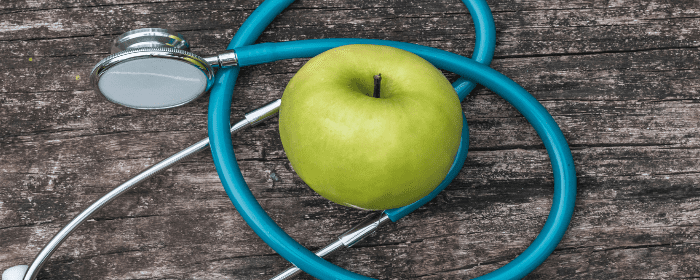
by admin | Apr 15, 2020 | Health Awareness
Certain illnesses are highly contagious and can be contracted just by breathing them in. Known as airborne diseases, these illnesses can spread when an infected person releases droplets from coughing, sneezing, or even speaking. The virus or bacteria is then secreted into the air and lands on individuals or objects.
When these pathogens are inhaled, they take residence inside the body and cause illness. They can also be contracted by touching entry points in the body, including the eyes, mouth, and nose, after you’ve touched a surface with the germs.
Since these illnesses move through the air, they’re notoriously challenging to control. Discover some examples of these infections and tactics for stopping their spread below.
What Are Some Examples?
Perhaps the most noteworthy example of airborne diseases is COVID-19. This disease, caused by the novel coronavirus SARS-CoV-2, is spread from person-to-person, including those who may not be showing symptoms, through the transmission of respiratory droplets. The main symptoms of the illness include fever, cough, and shortness of breath.
In addition to COVID-19, other examples of airborne diseases include:
- The flu
- The common cold
- Chickenpox
- Measles
- Mumps
- Whooping cough
How Can You Control the Spread of Airborne Diseases?
While airborne diseases can spread rapidly, there are several things you can do to minimize your risk of contracting an illness and preventing transmission to others if you do get sick.
For COVID-19, the CDC recommends the social distancing advisory of staying six feet apart from other individuals. Due to the rapid spread of the illness as well as its severity, they have also encouraged people to stay home as much as possible.
When it comes to preventing the spread of any airborne illness, commonsense practices can help reduce transmission. For example:
- Disinfect frequently touched surfaces often, including tables, doorknobs, keyboards, and phones.
- Wash your hands frequently using warm water and soap for at least 20 seconds. This is especially important before eating, after being in a public place, and before touching your face.
- Stay home if you’re feeling sick.
- Cover your cough or sneeze with a tissue or the inside of your elbow.
- Avoid close contact with individuals who are sick. If you’re sick, stay away from high-risk populations, including seniors, pregnant women, and individuals with compromised immune systems.

by admin | Mar 31, 2020 | Health Awareness
The benefits of regular exercise have long been touted by
medical professionals. Consistent physical activity is linked to a reduced risk
of heart diseases, long-term weight management, and countless other advantages. You’ve
probably also heard about its potential impact on mood: with the release of
feel-good chemicals, movement can aid in stress management and reduce the risk
of depression.
Indeed, mood improvements are a compelling reason to get active if you don’t already. But if you’re going to put the time and effort in, are there certain types of exercise that have a better chance of improving your mental health than others? Here’s what the research says.
Different Benefits from Different Types of Exercise
According to a study conducted by the University of South Australia and MSH Medical School Hamburg in Germany, of the 682 participants, those who met the WHO recommended guidelines of 150 minutes of moderate physical activity each week saw better mental health scores than those who didn’t. Interestingly, however, different types of exercise led to different effects on mental health. Specifically, the researchers looked at the results on mood from exercise in an outdoor, team, and individual settings. So what type of exercise is best to boost mental health.
The results show that while team exercise has an energizing
impact and keeps participants engaged, solo workouts are better for
contemplation and reducing stress. And, for most people, outdoor exercise is
more rewarding than indoor sessions if it’s in a safe area with greenery.
In addition to where and with whom you exercise, it’s also
critical to monitor the duration and intensity of your workouts. The study
revealed a link between higher levels of depression and vigorous exercise.
Thus, it’s possible to have too much of a good thing: like all else, moderation
is key when it comes to staying active. Just 30 minutes a day, five days a week
is all most people need to see mood-boosting benefits. In fact, it’s been linked
to the same mood improvements as taking
Prozac—of course, just without the side effects.
Yet, it’s also important to acknowledge that regular
exercise is not a cure-all. While it may help with depression, stress, and
anxiety, it may not stop major mental illnesses from unfolding. It’s therefore
critical to speak with a professional any time you experience lasting mood
issues that don’t improve or worsen.
Also, experts note that some exercise is better than none at
all. Even if you can’t meet the WHO recommendations, small bursts of activity
like a quick walk could suffice for lowering cortisol levels or simply clearing
your head.

by admin | Mar 24, 2020 | Health Awareness
We’re often told that a healthy diet is key to improving wellness and feeling our best. While it may not eradicate symptoms altogether, proper nutrition plays an important role in managing certain health frustrations, including the signs of menopause.
As you might imagine, one of the best ways to get ample vitamins and minerals to improve overall wellness is through plenty of fruits and vegetables. Yet, new research published in Menopause, the journal of The North American Menopause Society, suggests there are some specific choices that may have a better impact on alleviating menopausal symptoms than others.
Diet & Menopause
Previous research has indicated that certain foods influence the production of estrogen and metabolism, which can, therefore, have an effect on the severity of menopause. Specifically, diets rich in vegetables, fruits, and nuts, such as the Mediterranean diet, have been associated with fewer symptoms and complaints by women of menopausal age. Based on these findings, researchers sought out to determine whether certain vegetables and fruits could aid in reducing menopause symptoms more than others. According to their findings, the following foods appeared to improve urogenital scores, which encompass factors like urinary incontinence and vaginal atrophy.
- Citrus Fruits: Oranges often come to mind as the primary citrus fruits, but you can also incorporate grapefruit, clementine, and tangerines into your diet. When possible, incorporate lemon and limes into your cooking, too.
- Leafy Greens: Spruce up your salads by swapping out iceberg for Swiss chard, arugula, spinach, and curly kale. These leafy greens pack a powerful dose of nutrients despite having very few calories.
- Dark Yellow Vegetables: Look for in-season yellow vegetables next time you browse your local farmer’s market. Yellow bell peppers, squash, and golden beets are all excellent choices that can easily be incorporated into dishes like stir-fries or salads.
Although the effects of these dietary choices may vary from
one woman to the next, anyone seeking simple lifestyle tactics to help control
the symptoms of menopause may find it worthwhile to give these fruits and
vegetables a try. At the very least, you’ll be getting a hefty dose of
nutrients to support better overall health anyway. For more health awareness
blogs, visit our blog page at https://stemedix.com/blog/.

by admin | Mar 2, 2020 | Alzheimer’s Disease, Health Awareness
Maintaining proper nutrition is essential for optimal health. Our bodies need more than 30 vitamins and minerals to operate, with these nutrients supporting a host of processes including:
- Tissue production and regeneration
- Red blood cell production
- Nerve signaling
- Formulating chemical messages
While getting adequate amounts of these vitamins and minerals is important for supporting key body-wide mechanisms on a daily basis, it’s also critical for safeguarding our future health. Nutrition helps us minimize the risk of many serious conditions, one of which is dementia.
Can Nutritional Deficiencies Cause Dementia?
In some elderly patients, healthy dietary practices aren’t always
closely followed. This can lead to certain nutritional deficiencies, which can
actually cause cognitive impairment over time. Research shows certain forms of dementia
can be a direct result of deficiencies in specific vitamins, minerals, or
other nutrients. Here are a few nutrients in particular that are necessary for
cognitive function:
- Vitamin B12: Without ample B12, the frontal lobes of the brain become altered, resulting in cognitive or behavioral changes. The vitamin, therefore, supports brain health while playing an important role in maintaining healthy blood and nerve cells. It also aids in the production of DNA. Animal food sources are often rich in B12, including dairy and meat.
- Niacin: B3 or niacin helps to control cholesterol levels. Elderly individuals are especially at risk of developing pellagra, a B3 deficiency characterized by dementia, dermatitis, and diarrhea. Enriched cereals, seeds, poultry, and redfish are good sources of the vitamin.
- Thiamin: Also known as vitamin B1, a deficiency in thiamin can cause damage to the nerves and muscles, including the heart. Thiamin also has such a profound effect on cognitive function that some researchers speculate the vitamin could benefit Alzheimer’s patients, but further studies are needed to support this theory. Thiamin is commonly found in eggs, nuts, seeds, beef, and enriched grain products, such as cereals.
In addition, insufficient hydration
can lead to nutrition-oriented dementia.
Beyond cognitive symptoms,
nutritional deficiencies may also manifest physically in the following ways:
- Sensorimotor challenges
- Poor reflexes
- Extreme thirst
- Anemia
- Numbed sense of touch
- Gastrointestinal issues
Fortunately, these and other nutrition-oriented symptoms can
be avoided with a healthy,
well-rounded diet. In addition, certain individuals may benefit from
supplements if key nutrients can’t be acquired through diet alone. Talk to your
doctor if you think you could benefit from a supplement regimen.

by Stemedix | Feb 11, 2020 | Stem Cell Therapy, Erectile Dysfunction, Health Awareness
Erectile dysfunction (ED) is characterized by difficulty getting or maintaining an erection firm enough for sexual intercourse. It affects up to 30 million men and can stem from a broad range of causes, including stress, limited blood flow to the penis, and underlying conditions such as high blood pressure. While addressing any existing health issues that could be contributing to ED is important, addressing ED itself is also critical to supporting sexual health and quality of life. You may be asking yourself can stem cell therapy treat erectile dysfunction?
Traditionally, treatments for ED have included PDE5 inhibitors such as Viagra. Yet, these drugs are among the most controversial on the market. They relax the blood vessel walls in certain areas of the body and, while typically effective in addressing ED, are linked to both minor and serious side effects. Common side effects include nasal congestion, vision impairment and light sensitivity, indigestion, and headaches. More serious side effects include painful and long-lasting erections, damage to the optic nerve, hearing loss, and heart attack, among others.
When oral medications fail, treatments such as injection therapy and penile implants may be explored as a last resort. Yet, these treatments also have their own set of potentially serious side effects. For this reason, experts have been exploring alternative options for treating ED.
Stem Cell Therapy for Erectile Dysfunction
One promising treatment for ED which has emerged recently is stem cell therapy. In one clinical trial, men who have experienced ED after prostatectomy for prostate cancer experienced improved erectile function, even after all previously attempted treatments showed no results. The treatment has also shown promise for improving erections in men whose ED is caused by underlying conditions such as diabetes.
Stem cells work to promote tissue regeneration and healing, due to their ability to either become new cells through self-renewal or give rise to virtually any other cell type in the body. No other cells have these remarkable capabilities. When administered strategically, they can, therefore, promote the repair of almost any type of damaged or injured tissue.
Researchers are encouraged by their findings and believe that the treatment offers a powerful alternative to traditional therapies for ED, as well as a viable solution for patients who have not responded to other treatments. Men experiencing the frustrations of ED may therefore once again be able to achieve and maintain spontaneous erections without invasive surgeries, injections, or medications, thereby improving their sexual satisfaction and relationships.

by admin | Feb 5, 2020 | Erectile Dysfunction, Health Awareness
Erectile dysfunction (ED) may seem like an issue that exclusively affects sexual health, but it could actually be a telling indicator of larger issues with overall wellness. The issue could simply be a result of a lifestyle change, such as a new medication. For the majority of men, however, the underlying cause of ED is related to a physical issue, such as high cholesterol, clogged arteries, or high blood pressure.
The remedy for ED could, therefore, lie in making changes to promote better overall health. Here are some natural tactics you could try to improve both your wellness and your sex life:
Be Mindful of Heart Health
Your blood sugar, blood pressure, and cholesterol levels all
influence the arteries in the heart, brain, and penis. It’s therefore essential
to both your sexual and overall health that you monitor and control these
levels. Meet with your doctor regularly to discuss your vascular health, and if
needed, pursue lifestyle changes and medications to get on track.
Maintain a Healthy Weight
Obesity
is a known cause of ED, so losing weight if needed and maintaining a
healthy body mass index (BMI) are some ways to combat the issue. Being
overweight also contributes to diabetes and vascular disease risk, which are
also causes of ED. Moreover, excess fat can alter hormone levels, which can
play a role in the condition. Set a goal to reach and maintain a healthy weight
to prevent or alleviate ED.
Exercise Regularly
Men who exercise regularly are 20-30%
less likely to develop ED than their sedentary peers, according to a
Harvard Health study. While participants in the study either ran or completed
vigorous outdoor work, moderate and low-impact workouts can be beneficial, too.
In fact, walking just 30 minutes a day is linked to a 41%
drop in ED risk – proof that you don’t need to become a marathoner to enjoy
the health benefits of physical activity.
Eat a Balanced Diet
Diet influences many aspects of health, and sexual wellness
is no exception. According to the Massachusetts
Male Aging Study, men who follow a diet rich in natural foods including
vegetables, whole grains, and fish were less likely to experience ED than their
peers. Limiting or avoiding refined grains and red or processed meats is also
beneficial, according to the study.
Strengthen the Pelvic Floor
If you think Kegels are just for women, think again. Pelvic
floor strength is important for both men and women. Men, in particular, need
strength in this area to maintain rigid erections and prevent blood from
leaving the penis. One study in the UK
even showed that doing Kegels twice a day for three months, combined with
healthy habits like weight loss and smoking cessation, showed better results
than lifestyle changes alone.
Addressing ED isn’t always simple since it often involves a complex interplay of physical, hormonal, and psychological factors. Yet, trying these tactics can’t hurt, as their benefits will extend to your overall health while increasing your odds of combatting ED.







 St. Petersburg, Florida
St. Petersburg, Florida
